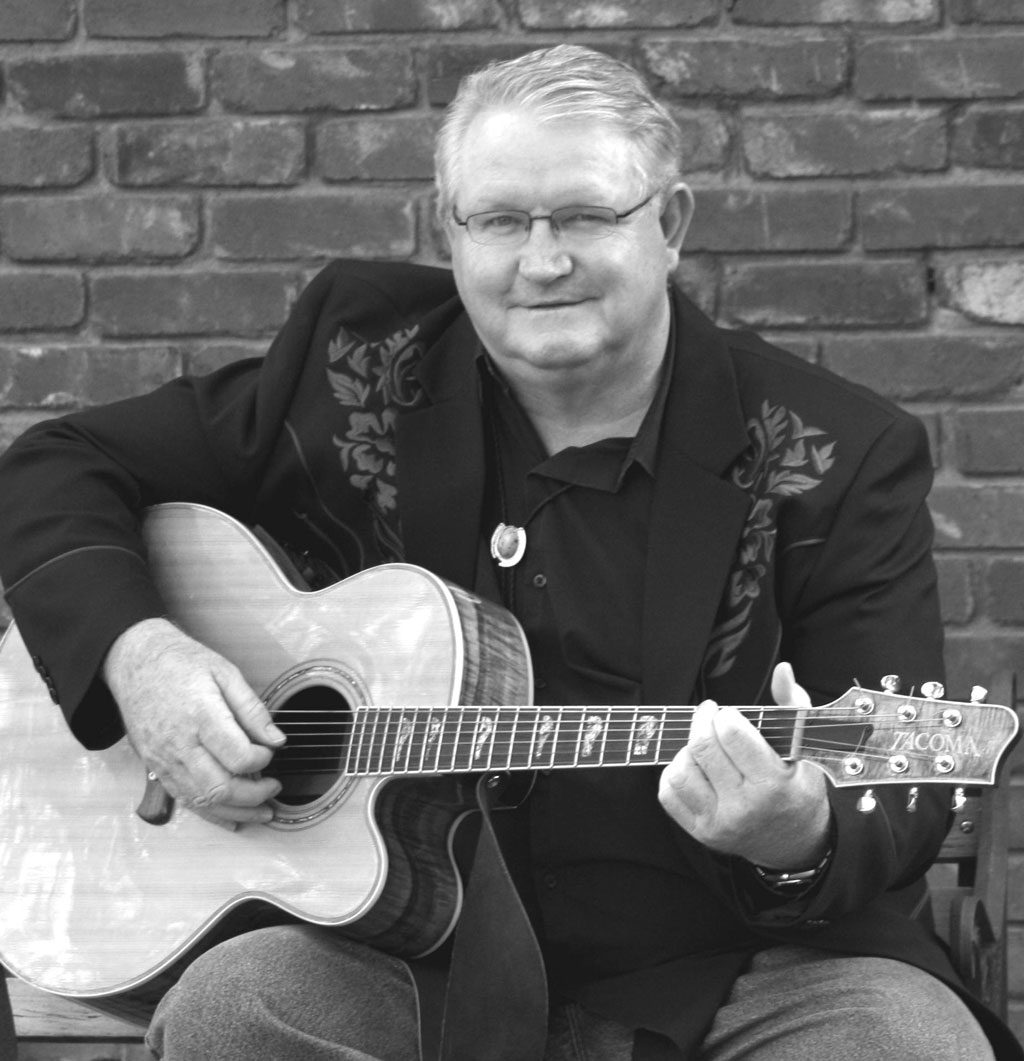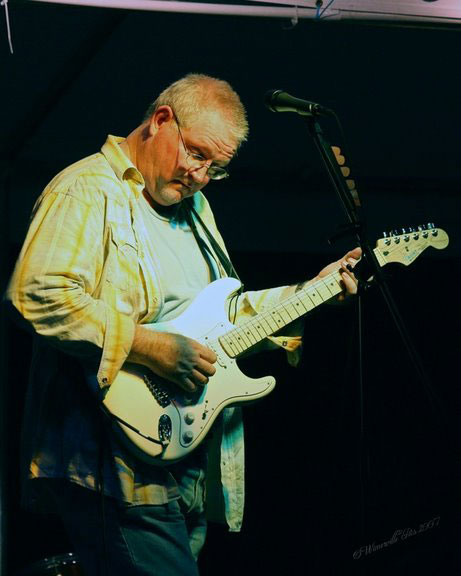
After more than four decades of performing before audiences in venues large and small, even as he deals with a disease that’s robbed him of his singing voice and thrown off his timing, Jay Lankford continues to work in a profession that’s almost as old as music itself.
Lankford is a sideman. Although he’s led his own bands over the years and spent plenty of time in front of a microphone, that’s how he sees himself – as one of those backup musicians who, he says, “make the star shine a little bit brighter.”
Lankford, who plays guitar, bass and keyboards, feels so strongly about sidemen that he’s written a new novel, much of it drawn from his own experiences. In the self-published Sideman, he tells the story of a kid from Stroud named Jason James, whose childhood dreams of playing the Grand Ole Opry and youthful days of performing Merle Haggard tunes along with rock music at high school proms and teen dances lead to a life as a professional traveling country musician.
Writing the book, Lankford says, was therapy for him after he left the road in the late ’90s. He also thought it was important to present a view of life from the edge of the spotlight rather than its center, as is usually the case.
“Sidemen don’t make the money the stars make, and that’s fine. The stars deserve it. But sidemen deserve a little credit, too, because they’re the ones that make it happen,” he says. “I’d talked to a lot of ’em throughout the years and I had a lot of stories. Jason James is kind of composed of a lot of the sidemen besides myself. It’s not just about my experiences; it’s everybody else’s, too.”

Still, Lankford adds that the first part of the book is “extremely close” to his life as a music-loving kid growing up in Stroud. That’s true right from the opening scene, a nice evocation of small-town Oklahoma life in the ’60s as Jason’s 9-year-old cousin, Kate, brings him to the stage of the Opry, which is in fact the top of the storm cellar in his family’s backyard. Some 300 pages later, after lots of highs and a few harrowing lows, a highly successful Jason James reflects on his life as a top sideman and hit songwriter, thanking God for his blessings.
While the second part of Sideman has a what-might-have-been quality, it still carries the ring of authenticity. As a sideman, Lankford lived behind the scenes and saw how the business worked and experienced the realities of life on the road with a bona fide country-music up-and-comer. Called Blake Preston in the book, this character is based on Columbia Records artist Johnny Duncan, who charted a significant number of country hits between the late ’60s and late ’80s. The apex of his recording career came in the late ’70s, when, either dueting with labelmate Janie Fricke or singing by himself, he scored the No. 1 hits “Thinkin’ of a Rendezvous,” “It Couldn’t Have Been Any Better” and “She Can Put Her Shoes Under My Bed (Anytime).”
Lankford’s stint with Duncan took place a few years before those records, when the singer was on the road playing solo, without a band and accompanied only by his girlfriend. It was during that time that he happened into a Stroud music store where a teenage Lankford – then a member of a local rock band called Mellow Heat – was working. Duncan came in to look at guitars, and Lankford began giving him advice.
“I didn’t know who he was,” Lankford says. “I was in rock, and I didn’t know anybody in country except for the big names. He took one of the guitars and started singing and playing, and I grabbed an old bass from the wall, and a Casino amp, and sang harmony with him. So we’re sitting there playing, and these two old women – well, I thought they were old, but they were probably about 30 – came in and started oohing and aahing over Johnny.
“They said, ‘Man, you guys sound good together. You ought to take him with you.’
“He didn’t say anything. We just kept playing. Then, when he had to go, he said, ‘How about it? You want to play with me tonight?’
“‘Who are you?’
“‘I’m Johnny Duncan, with Columbia Records.’
“So I played with him at the Chandler rodeo that night.”
Lankford can’t recall the headlining act, but he remembers performing four or five songs with Duncan, who opened the show.

“We played, and I was packing my stuff up when he said, ‘You think you want to take a trip with me, do a couple more gigs?’ Well, yeah, I did. So for the next two months we toured around in a ’71 black El Dorado Cadillac with a horse trailer that carried big ol’ JBL Voice of the Theater speakers, about 135 pounds apiece. We’d play ‘Jo and the Cowboy,’ which was a hit for him back then, and songs like ‘Guantanamera.’ We’d only play about 10 songs maximum.”
As Duncan’s star continued to rise, he put together a backing band, which included Lankford as a key member. Duncan’s group was to debut in Oklahoma City, but Lankford’s part in it ended when he witnessed another band member doing cocaine before the show and, to put it mildly, had an extreme reaction.
“It’s a weird thing, but it scared me,” he says. “I almost blacked out. It’s not something I like to talk about too much, but I took a fire extinguisher to him. I was a hot-headed kid back then; I didn’t know any better.”
After that incident, Lankford left the band and returned home, where he started working with fellow Oklahoman Eddie Burris, Merle Haggard’s former drummer and the co-writer of “Okie From Muskogee,” backing touring acts and playing other gigs as well.
“I played with Eddie, and I played with [Oklahoma country star] Sammi Smith on some stuff,” he says. “I don’t want to be a name dropper, but I played with a lot of ’em. I liked country back then, classic country, and that’s what I did. Then, about ’93 or ’94, I started playing with a guy named Sean Adair, and we went locally and regionally for a while, opening for a lot of main acts.”
Lankford continued playing country music into the middle of the last decade. These days, however, you’re most likely to find him plying his trade on Sunday mornings at Broken Arrow’s Freedom City Church. He’s an ordained minister who plays bass with a band called the Last Day Voices.
“I got diagnosed with Parkinson’s disease, so my timing’s off and I have to play with somebody who can keep good time,” he says. “I can’t sing; my voice won’t allow it. But it’s OK because I know God’s going to heal me. I really do.”
Near the end of his book, Lankford writes, “Changes occur and life takes a turn.” That’s certainly what’s happened throughout his career and life; it is, in greater or lesser measure, what happens to us all. But then, he adds, “Sometimes, in the darkest of hours, we’re not able to see down the road, but God’s love is always there. We just need to open ourselves up and reach for it.”
In reaching for that love through music, and in writing a book about the life of a country-music player who seeks and ultimately finds redemption, Lankford leaves a legacy that would make any sideman proud.

























